Looking for a simple, non-toxic fabric softener that also saves money? If so, this blog is for you! There are 4 simple ways to soften laundry naturally: vinegar, salt, wool dryer balls, and homemade dryer balls. I’ll break down each method below.
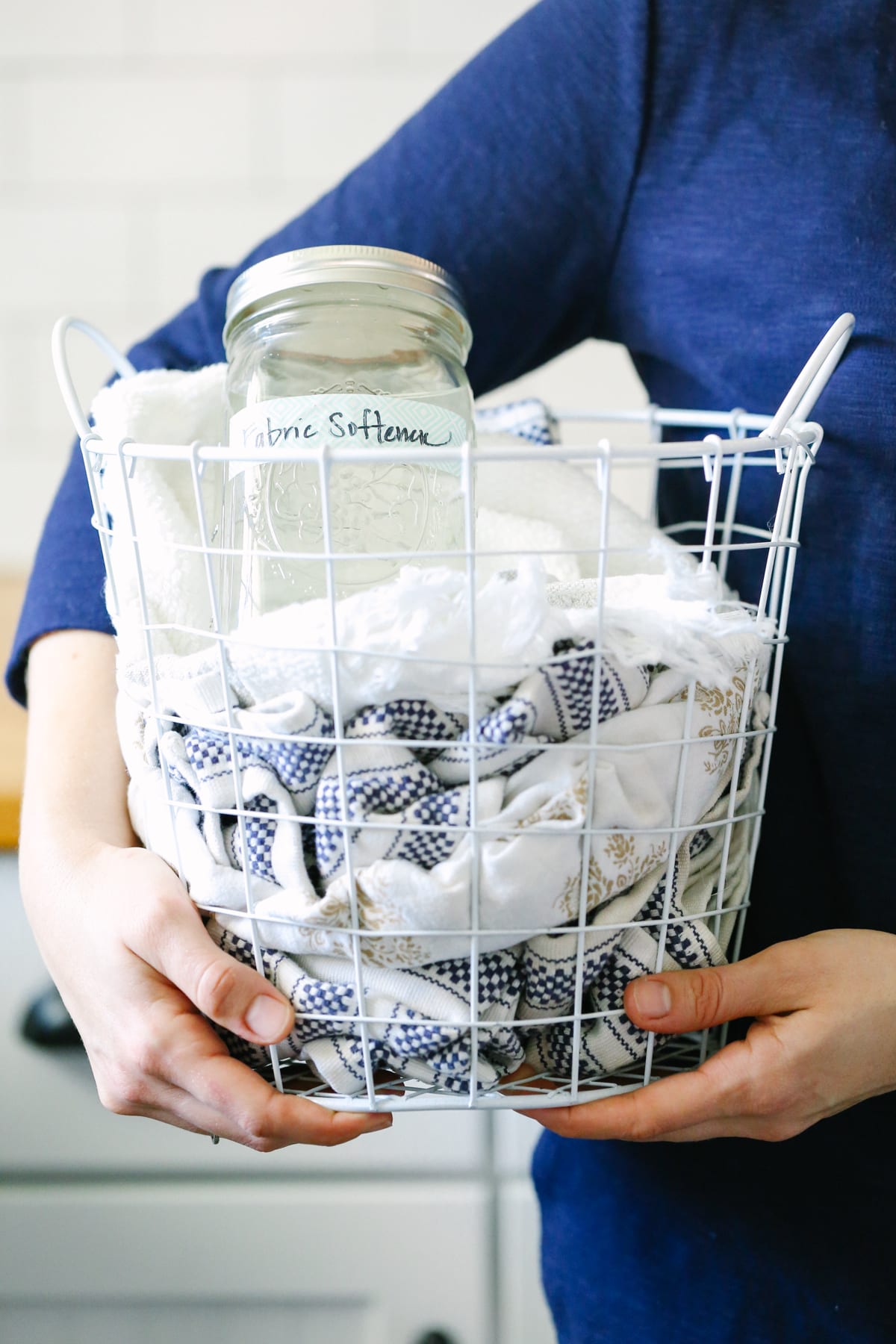
Want to Save This Article?
Enter your email & I’ll send it straight to your inbox. And you’ll get new recipes & tips each week.
In this blog, I’m outlining the exact steps you need to know to use vinegar to soften clothes naturally.
Before You Get Started
- Fabric softener, a common household product, softens clothes, particularly towels and sheets.
- Most fabric softeners rely on harsh chemicals (source), like synthetic fragrances. These artificial scents may irritate sensitive skin or allergies (source). Fragrances are also typically used in laundry detergents.
- There are 4 ways to soften laundry naturally: vinegar, salt, wool dryer balls, and homemade dryer balls. I’ll break down each method below.
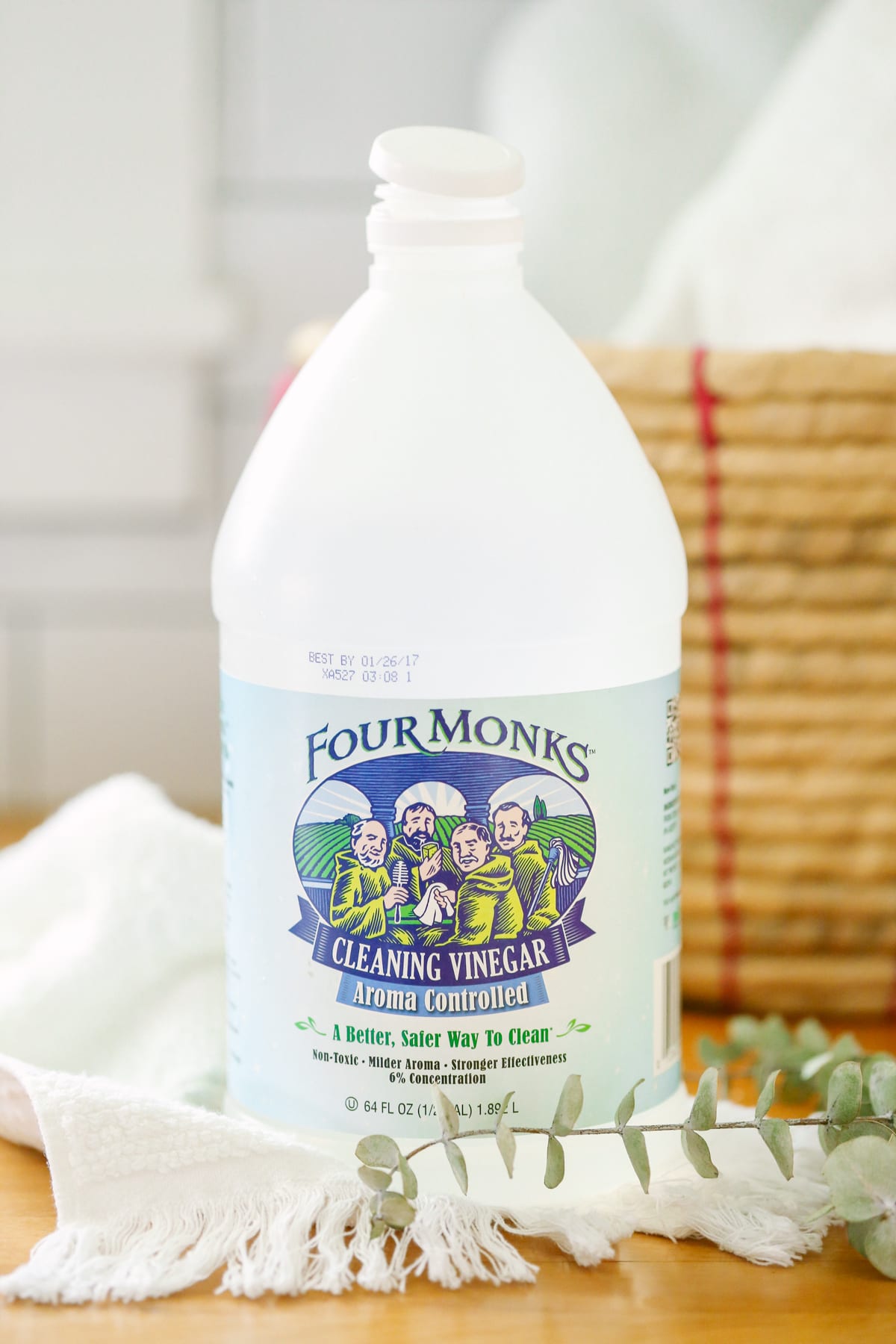
How to Use Vinegar to Soften Laundry: Step by Step Guide
Here’s the simplest, homemade liquid fabric softener. This simple way of softening laundry requires no mixing, expensive ingredients, or hair conditioner (yes, that’s a thing). All you need is a cheap bottle of vinegar!
What You’ll Need
- 1 bottle of white vinegar (1/2 cup Distilled White Vinegar per standard load of laundry)
Instructions
- Add the vinegar to the washing machine during the rinse cycle, to the fabric softener dispenser, or a fabric softener ball (like a downy ball) at the beginning of the wash cycle.
Can you Add Essential Oils?
Some people like to mix a couple of drops of essential oils with vinegar in a small bowl before adding to the wash, but I don’t see the point in doing this. The clothes will not end up smelling like the essential oil. Instead, save the essential oils for other natural cleaners.
Why Use Vinegar to Soften Laundry?
The easiest and cheapest fabric softener is straight white distilled vinegar.
- Excellent Cleaning Power – Vinegar is a natural ingredient containing 4-6% acetic acid, making vinegar an excellent cleaning ingredient.
- Breaks Down Detergent – When used in the wash, vinegar may help soften fabrics by breaking down excess detergent left on the clothes (source).
- Neutralizes Odors – Vinegar also neutralizes odors, even mildew odors that can linger on clothes.
- Breaks Down Mineral Deposits – A high mineral content in your water may also leave clothes feeling stiff. Vinegar works to break down mineral deposits, which can also help soften garments.
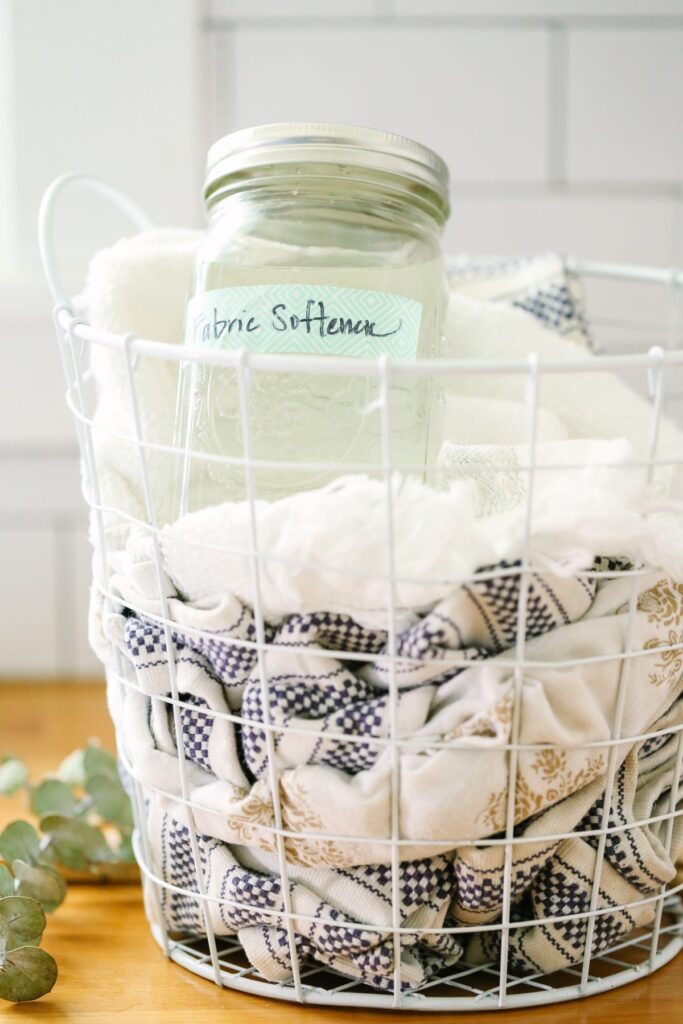
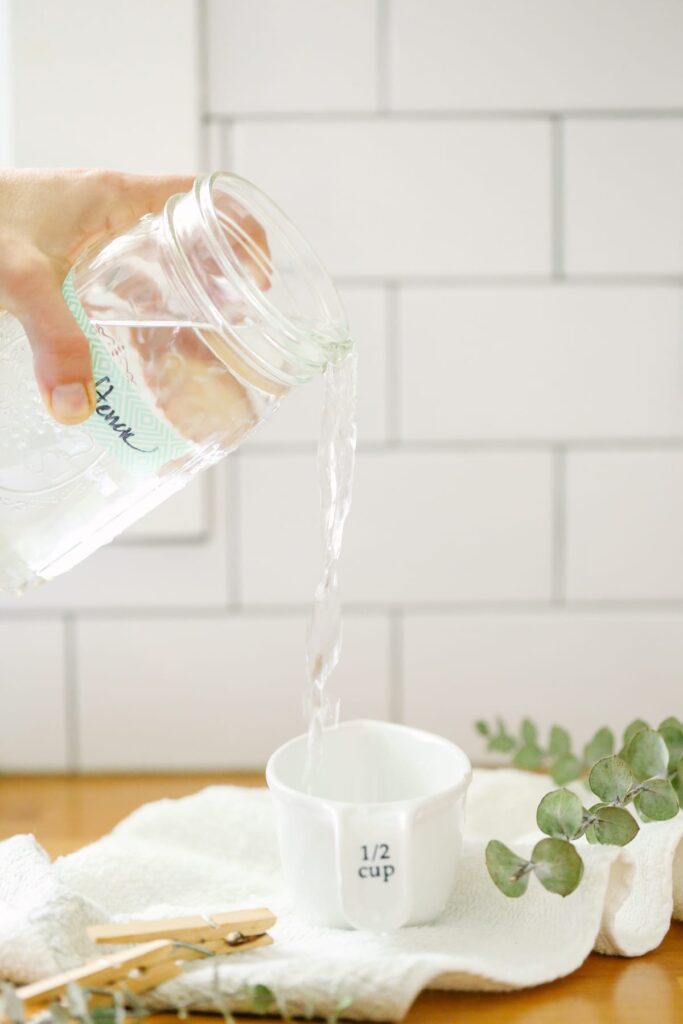
What to Avoid Doing
Vinegar isn’t always the right answer. There are certain times when you shouldn’t use vinegar or need to take precautions. Let’s talk about each scenario.
- Elastic Workout Clothes – The acid in vinegar breaks down elastics over time. Don’t use vinegar with elastic fabrics, like your favorite Lululemon yoga pants. Instead, opt for the non-vinegar options below.
- Never Mix Baking Soda and Vinegar – Some recipes call for mixing baking soda and vinegar to make a fabric softener. Baking soda is a base, while vinegar is an acid. When combined, they create a chemical reaction and cancel each other out. Not harmful, but not effective. When you do this, you’re wasting ingredients. Instead, use plain vinegar (distilled white vinegar) straight in the washer.
- Mixing Castile Soap & Vinegar – Another combination that doesn’t mix is castile soap and vinegar. Homemade laundry detergent recipes are often made with castile soap, including my favorite liquid detergent and powder laundry soap. The good news is you can use straight vinegar as a softener and castile soap laundry detergent. You will not have an issue since you’re not mixing the two ingredients directly but instead using them in a giant washing machine (filled with lots of water). Keep the two products in separate compartments (one in the laundry soap compartment, the other in a downy ball or fabric softener compartment), as they’ll release at different times.
- Never Mix Vinegar With Bleach – The two ingredients will create a dangerous gas. If you plan to use bleach in the washer, skip this fabric softener and choose another option below. Or, try my homemade bleach alternative.
Three More Natural Fabric Softeners
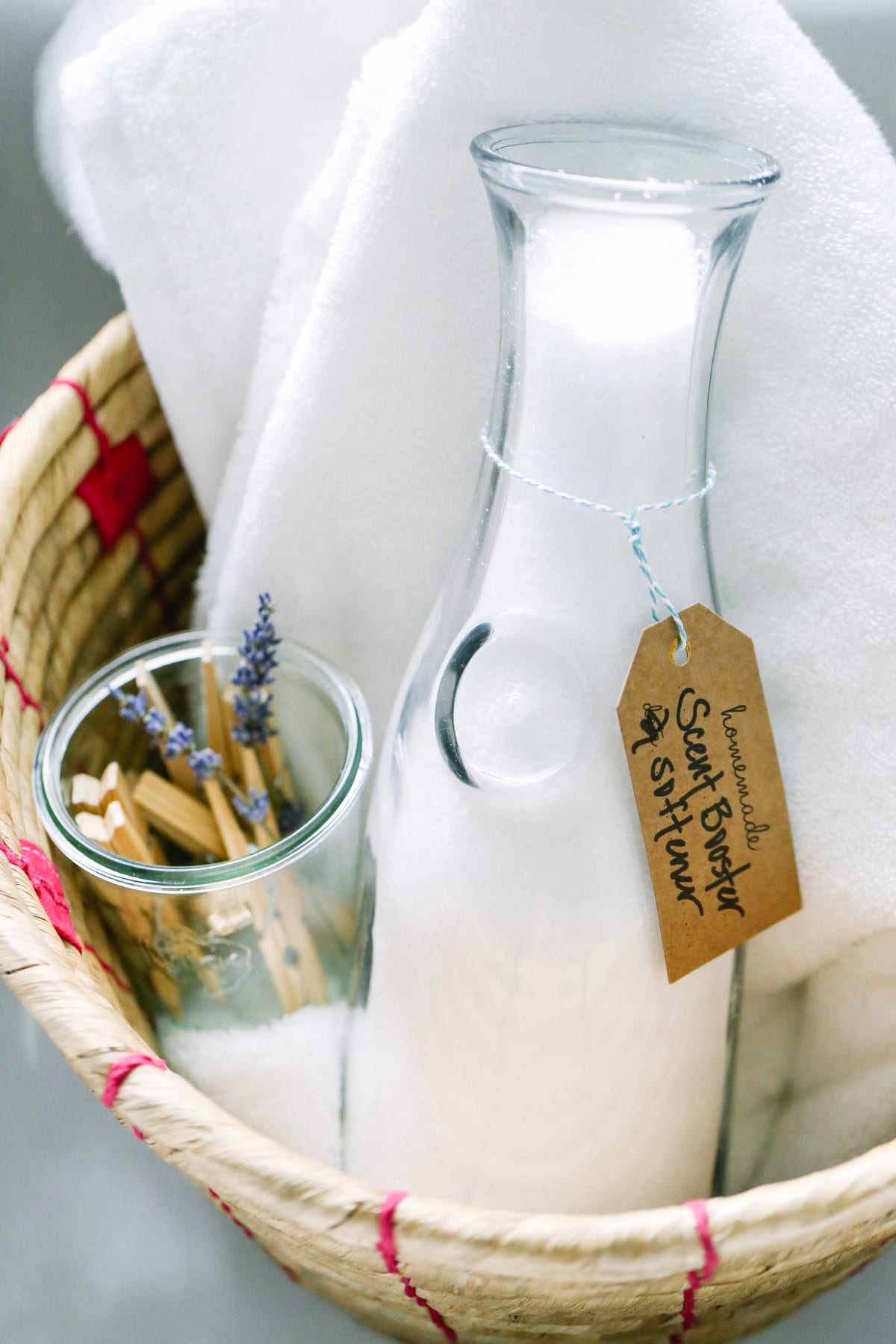
Option 1: Salt
Salt is a favorite ingredient for lifting some laundry stains. And you can use salt as a fabric softener. I share a detailed recipe for this softener/scent booster here.
How to Make & Use
- Ingredients: 4-5 cups coarse sea salt or kosher salt + 1-2 teaspoons essential oil of choice
- How to Make: Pour the salt into a large storage container (make sure it’s wide enough to mix or shake the salt with the essential oil. Add the essential oil, then mix the salt and essential oil with a spoon or whisk (or shake the container). Let the mixture rest for 24 hours to allow the essential oil to infuse the salt.
- How to Use: Add 1/2-1 cup of salt to the washer per load. Add the salt directly to the washing machine basin at the beginning of the wash cycle.
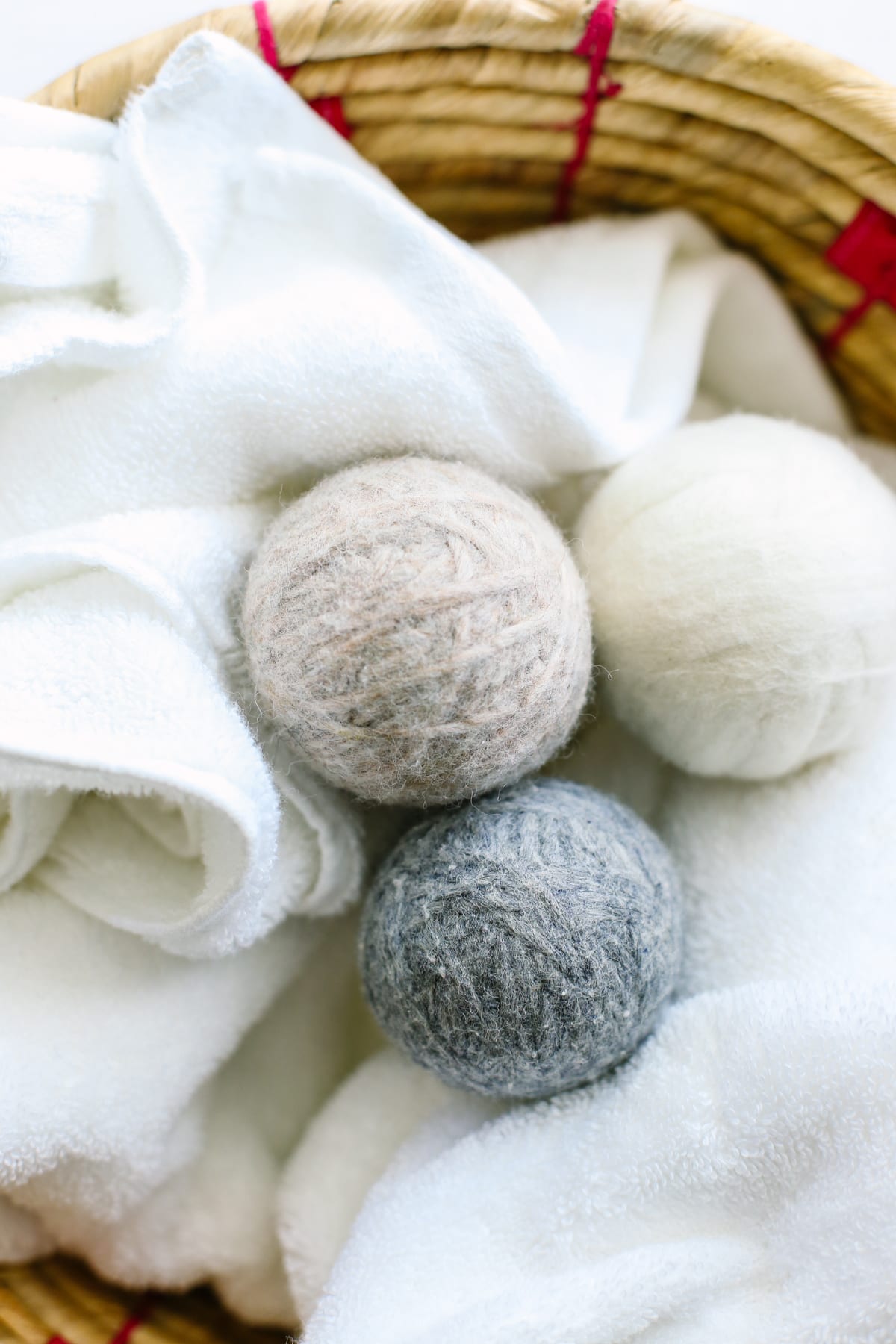
Option 2: Wool Dryer Balls
Dryer balls are not a traditional fabric softener but an excellent option for softening laundry. Wool dryer balls are an alternative to commercial dryer sheets.
How to Make & Use
- DIY and Store-Bought Options: You can make wool dryer balls if you’re crafty. Or, purchase a set of dryer balls from Amazon.
- How to Use: Add the dryer balls to the dryer, with wet laundry, and dry. If you’d like a subtle scent, add a few drops of essential oil to each dryer ball before using. Some people add a safety pin to a dryer ball before tossing it in the dryer to reduce static cling.
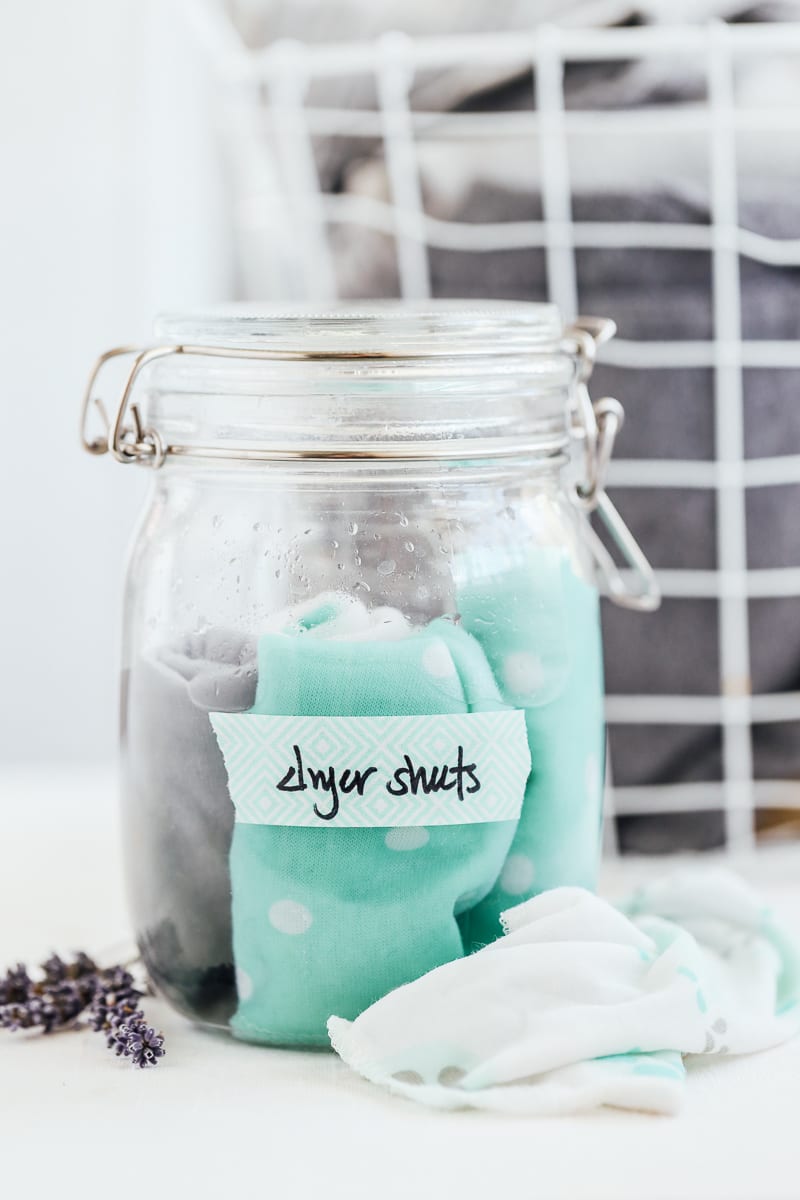
Option 3: Homemade Dryer Sheets
I share how to make your own dryer sheets in my Natural Cleaning Made Easy cleaning course.
How to Make & Use
- Ingredients: 2 cups vinegar + 50 drops cleaning essential oil + 10 8-inch square cloths (such as baby washcloths, small towels, cut-up old shirts, etc.)
- How to Make: Combine the vinegar and essential oil in a storage jar. Add the cloths to the pot, submerging the cloths in the liquid.
- How to Use: Add 1-2 cloths to the dryer at the beginning of the cycle, along with wet clothes. The cloths won’t reduce static cling but soften laundry and add a fresh scent. Return the cloths to the jar after use, re-sumberging in the liquid.
FAQs
- Can I use both salt and vinegar as a fabric softener? Yes, you can! The only combo I don’t recommend using together is baking soda and vinegar.
- I know castile soap and vinegar don’t mix well. Can I use a homemade laundry detergent (made with castile soap) with vinegar? Yes, you can. Since the machine has so much water to dilute the two products, you can use castile soap detergent and vinegar as a fabric softener. Just don’t combine the two directly in one container.
- I’ll definitely have to try these out and see which I like best. Which one would you say leaves clothes smelling the freshest? Vinegar works great for eliminating odors, so it’s my favorite for the freshest clothes.
JOIN NATURAL CLEANING MADE EASY
50 natural cleaning recipes, cleaning cheatsheets, and video tutorials
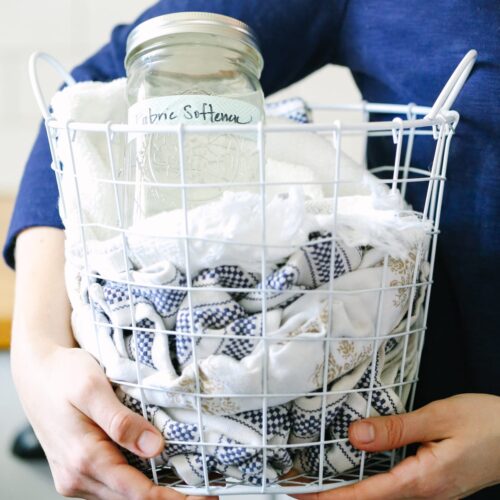
Simple Homemade Liquid Fabric Softener
Ingredients
- 1/2 cup Distilled White Vinegar per load
Instructions
- Add the vinegar to the washing machine during the rinse cycle, to the fabric softener dispenser, or a fabric softener ball (like a downy ball) at the beginning of the wash cycle.
- If you're looking for an alternative to vinegar, use wool dryer balls or salt laundry softener.
Notes
- Exercise Clothes: The acid in vinegar breaks down elastics over time. Don’t use vinegar with elastic fabrics, like your favorite Lululemon yoga pants. Instead, opt for the non-vinegar options in the post above, like wool dryer balls, salt, or homemade dryer sheets.
- Castile Soap: Yes, you can use this vinegar solution with a castile soap based laundry soap. You will not have an issue since you’re not mixing the two ingredients directly but instead using them in a giant washing machine (filled with lots of water).
- Essential Oils: Some people like to mix a couple of drops of essential oils with vinegar in a small bowl before adding to the wash, but I don’t see the point in doing this. The clothes will not end up smelling like the essential oil. Instead, save the essential oils for other natural cleaners.
Free RECIPE Cheatsheet
8 Natural Recipes for Your Laundry Room
More Natural Laundry Products
I’m a big fan of making laundry products, as they’re cheap and effective. That’s what I teach in my course, Natural Cleaning Made Easy. Here are a few of my favorite products.
- Homemade Detergent Recipe: Pick your favorite, either homemade liquid soap or powder laundry soap.
- Best Store-Bought Laundry Detergents: Don’t want to make your own laundry soap? Here are the best store-bought detergents.
- Stain Remover: Combining the power of castile soap, lemon essential oil, and hydrogen peroxide. This stain remover is excellent for pre-treating laundry and tackles any stain!
- Bleach Alternative: Avoid bleach with this simple formula. Perfect for soaking fabrics that are dull and need brightening.

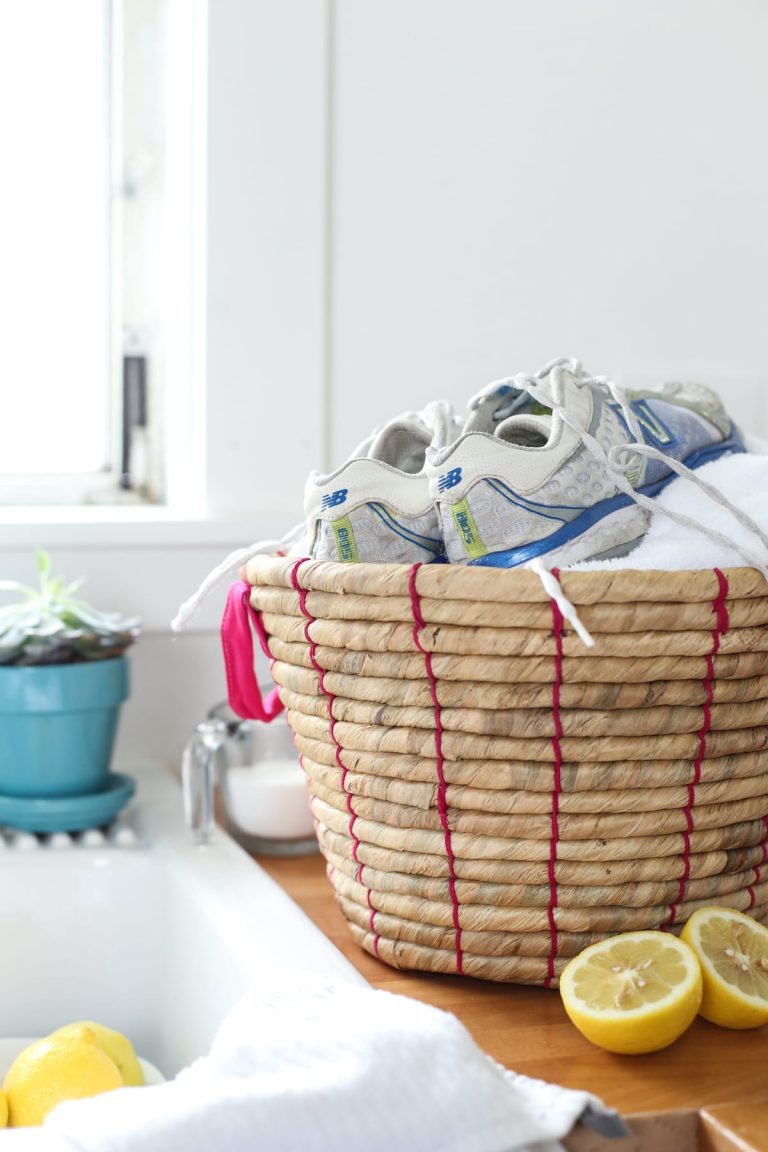
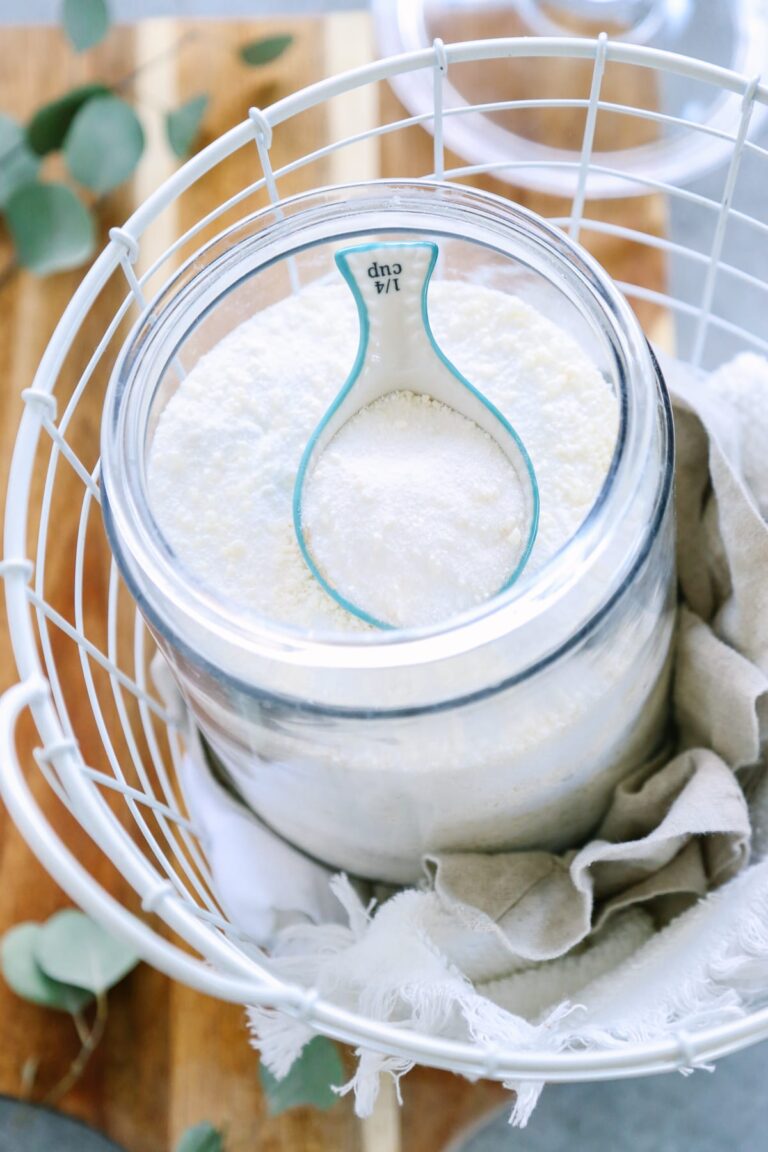
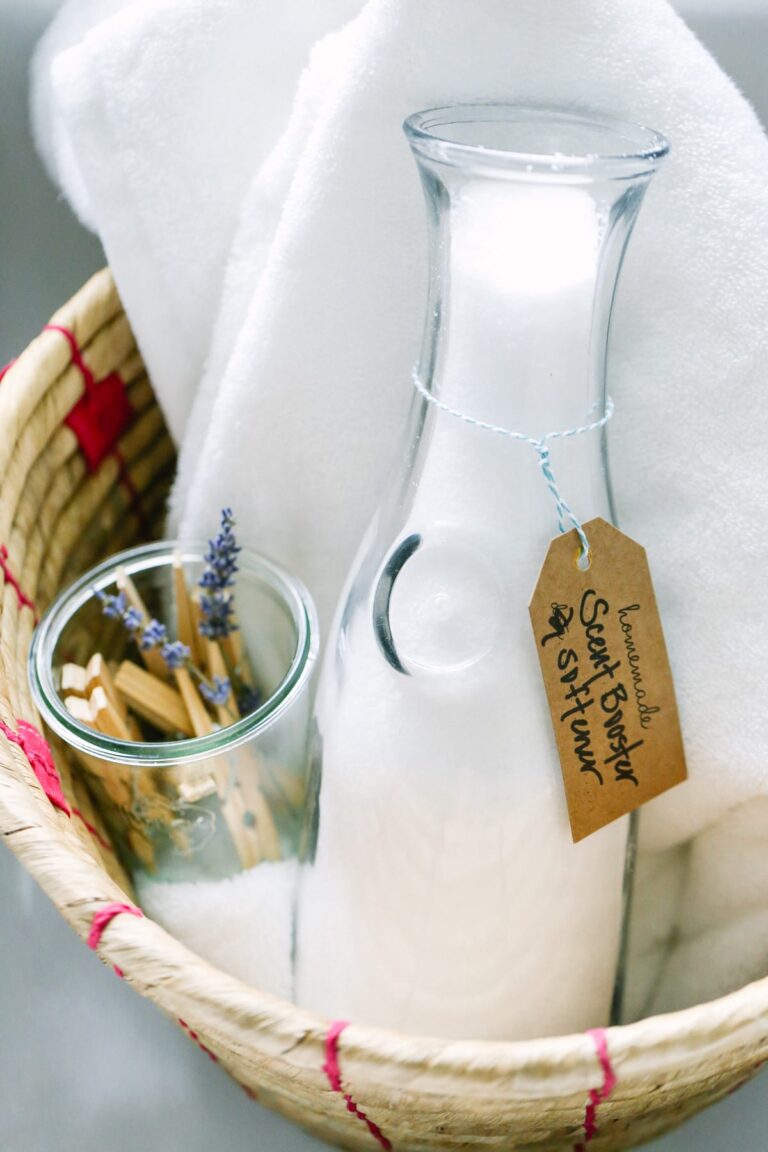
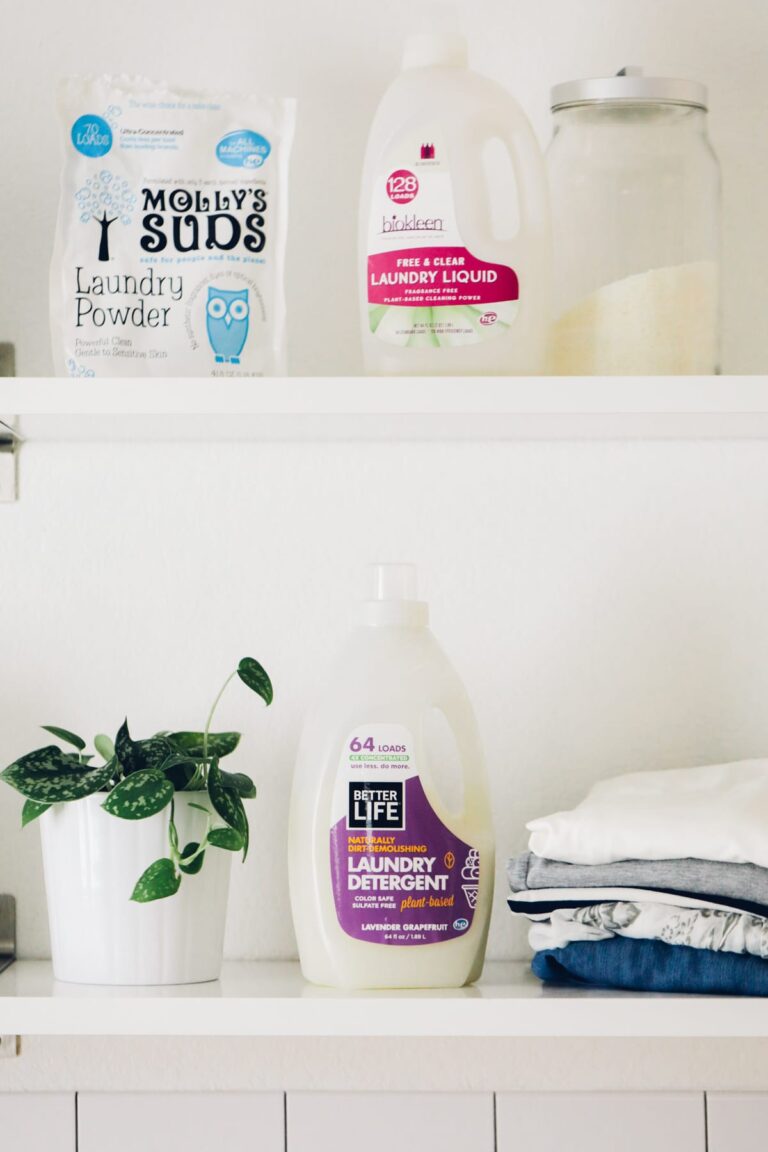
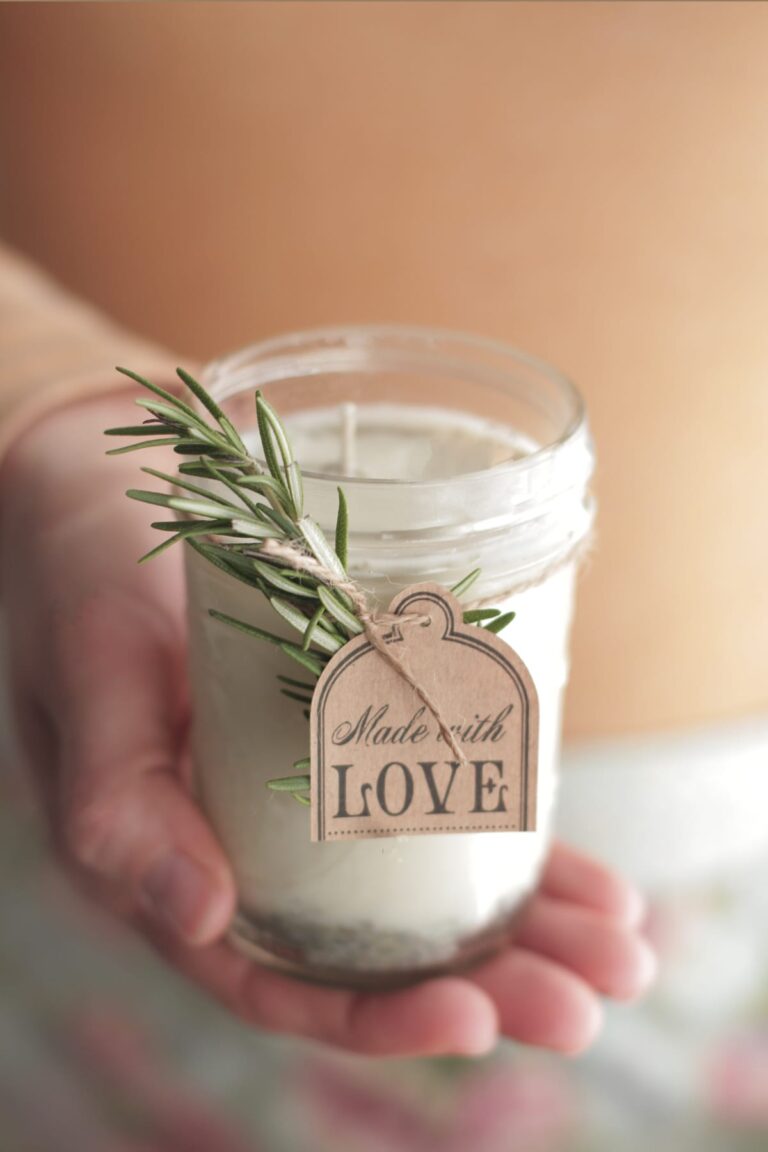
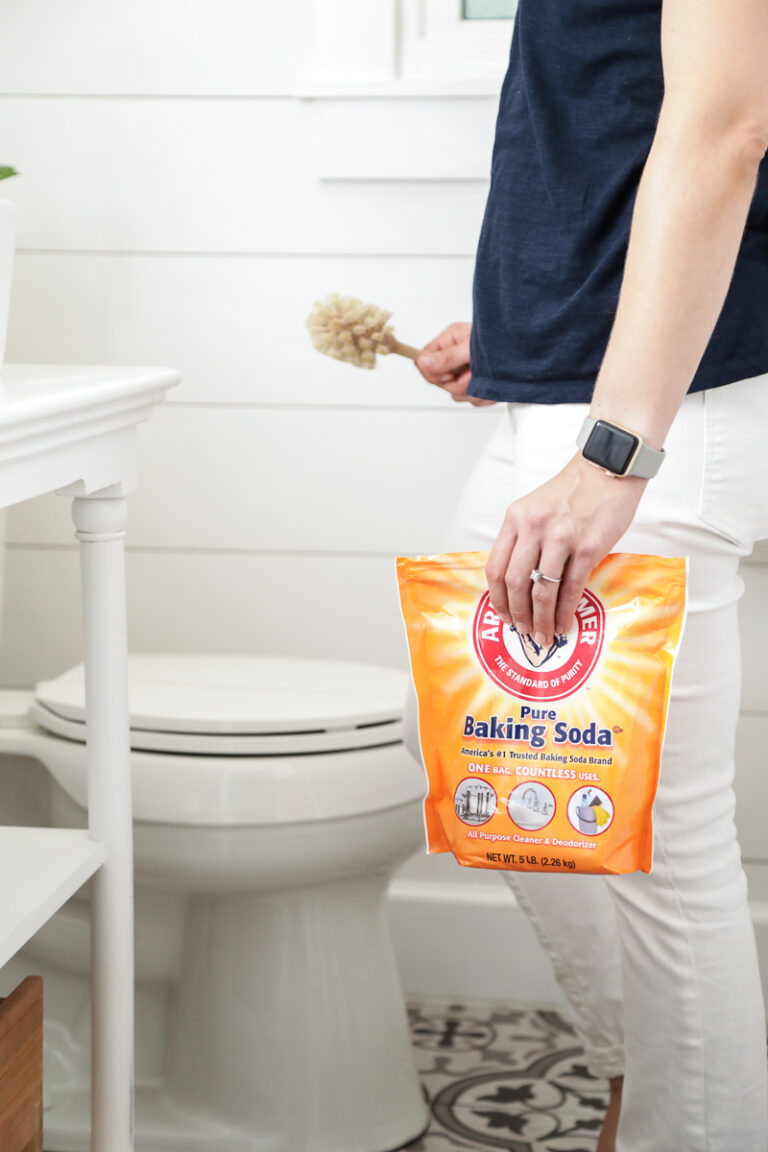
This worked great.
So happy to hear that, Ainsley!
I really like this information, but I must add something here. Adding salt to vinegar lowers the pH under 2.0, making it even more acidic than pure lemon juice and on the way to being as strong as gastric acid in your stomach.
Many people in the jewelry business use a bath of distilled white vinegar and salt to remove the outer coating on sea shells so that the shiny nacre can be seen. Left alone in this vinegar/salt bath for more than a day, sometimes just half a day, the shell will dissolve entirely. I don’t know enough about clothing, which is why I was reading this site, but if it will dissolve calcium, it might not be that friendly to cotton.
Hey, I think you might have misunderstood the recipe. There isn’t a salt/vinegar combo here.
I’ve also used vinegar for decades with great success. One thing I’ve also done is add baking soda tablets in the pre-wash for super-smelly stuff. Think sports uniforms and such. With the baking soda in the pre-wash and vinegar in the rinse, they don’t meet or have a chance to react.
Oops. Forgot to mention that I look forward to trying the salt. Thank you for this post!
I used vinegar for a while but my sheets developed light spots, like bleach can do. Anyone else experience this? I loved the vinegar before that happened. I have a front loader, don’t know if that has anything to do with it….
Hey, Cat. I wonder if the vinegar was reacting with another product in the wash. What kind of soap/detergent was being used with the vinegar?
why would the vinegar cause grease stains?
Hey Diana, If you’re using a castile soap-based laundry soap, the vinegar will result in unsaponified soap, which may result in grease stains on garments.
I’ve really enjoyed reading your story and tips to live simply and trying some of them. Sooo, how do you add the vinegar to a front load washer. My husband can’t stand the smell of vinegar, so I’m a little concerned about using it & don’t know how I could use the salt method for softening in the front load washer. Thanks for all the effort you put in to your blog.
Hey Ellen, I totally understand the vinegar issue. I’m not a huge fan of the smell either, but luckily when it’s used for a laundry softener, the odor disappears. We just got a new washing machine, and in my machine there’s a little compartment for “laundry softener.” That’s where I’ve been adding it, when needed. I wonder if you could also use a Downey Ball?
Good Day,
Thank you for the softener recipe with salt, My question is, if you use kosher salt, do you leave it in the large pieces? or do you /can you grind it into an almost course powder?
It might make it so you wouldn’t have to use so much?
Thanks very much
Hey Don, I use the salt “as-is.” You may be able to use fine table salt.
Haven’t had a chance to try this yet but was wondering if vinegar balls could be made … like fleeced wood balls soaked in vinegar? Any ideas?
Hey Heidi, I just realized that I missed your comment…I apologize. That may work. Another option is to soak rags or washcloths in the vinegar, then toss a sheet in the dryer.
I’ve been using vinegar as a fabric softener for nearly a year now and have found no problems with it at all! I keep a 750ml bottle and add a spring of rosemary and 20 drops of lavender essential oil to it for a nice scent. (It’s actually not that heavy – smells nice when the wet washing comes out but it doesn’t last.) I use it in combination with a castile-based homemade laundry liquid – they go in separate compartments in my front-loading washing machine so I haven’t come across any problems at all with grease stains or clogging 🙂
Why does the washing machine rust with this method?
Hey Mary, I personally haven’t experienced this issue, but my guess is that with smaller loads or HE washers (using much less water) if the vinegar sits on the walls of the machine for an extended period of time, it could possibly rust the metal.
Can you combine this with the salt based fabric softener and scent booster?
Hey Helen, I haven’t tried combining the two, but chemically-speaking I believe you can. Salt and vinegar are friends (unlike baking soda and vinegar ;)). If you try it, let me know how it goes!
Wow, how timely..I was just putting fabric softener on my list…thanks as always timely information 🙂
Perfect, Melody! I’m glad the information was helpful! I would love to hear what you think of the homemade solutions :).
Can you combine this with the salt fabric softener and scent booster for double impact?
Hey Helen, I haven’t tried combining the two, but chemically-speaking I believe you can. Salt and vinegar are friends (unlike baking soda and vinegar ;)). If you try it, let me know how it goes!
These look great! I’ll definitely have to try these out and see which I like best. Which one would you say leaves clothes smelling the freshest?
Hey Jordan, Both work equally well in the scent department :).
I love using vinegar in the wash. I would only add a word of caution. I know from personal experience using a Downy ball with vinegar, be sure you don’t use it on your last load of the day so that the washing machine gets a good rinse before it’s left to dry otherwise your washing machine will rust in a major way. (Oops)
I like to add vinegar to a prerinse when washing new clothing and after that the colors won’t ever run.
I also love the salt softener, it works great.
(Oh and I had to use CLR in my washing machine to fix the rust problem.) Just running a rinse cycle after my last load helped keep my washer from rusting again.
Thank you for sharing, Bethany! That’s very good to keep in mind!
Don’t forget that vinegar in any shape or form is acidic.